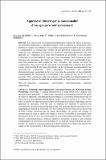Apprendre : interroger la consensualité d’un agir-percevoir connaissant

Type de référence
Date
2024-07-15Langue de la référence
FrançaisEntité(s) de recherche
Résumé
La connaissance est usuellement appréhendée comme une chose, ce qui pose
des problèmes didactiques et épistémologiques. Dans le cadre de nos formations, pour
prendre en compte ces problèmes, nous adoptons une approche énactive qui nous amène
à conceptualiser la connaissance comme un agir-percevoir connaissant. Cet article
explicite notre démarche et présente les ressources théoriques permettant une telle
approche de l’éducation avec pour but notamment de permettre à nos étudiants
d’interroger la consensualité de l’agir-percevoir connaissant. Nous adoptons le cadre
théorique du languaging développé par Maturana (1978) pour appréhender l’agirpercevoir
connaissant tant comme un faire (connaître) que comme un objet (la
connaissance). Nous précisons le concept de consensualité pour expliciter dans quelle
mesure il est possible d’interroger, du point de vue de l’apprenant, la consensualité d’un
agir-percevoir connaissant. Nous présentons brièvement une approche
phénoménologique permettant de favoriser une prise de conscience et une potentielle
transformation de l’expérience correspondant à des points de vue en 1re, 2e et 3e
personne. Nous esquissons enfin une approche relationnelle pour désubstantialiser la
connaissance et préciser la nature de la consensualité de l’agir-percevoir connaissant.
Résumé traduit en anglais
Knowledge is usually understood as a thing which poses didactic and epistemological problems. To address these problems in our training courses, we adopt an enactive approach, conceptualizing knowledge as a knowing acting-perceiving (or knowing as a “perceptually guided action” in the words of Varela et al. (1991). This article explains our approach and presents the theoretical resources supporting such an approach to education, with the aim of enabling our students to question the consensuality of the knowing acting-perceiving. We adopt the theoretical framework of languaging developed by Maturana (1978) to approach the knowing acting-perceiving as both a doing (knowing) and an object (knowledge). We define the concept of consensuality in order to clarify the extent to which it is possible to investigate, from the learner's point of view, the consensuality of a knowing acting-perceiving. We briefly present a phenomenological approach aimed at promoting awareness and potential transformation of experience corresponding to 1st, 2nd and 3rd person points of view. Finally, we outline a relational approach to desubstantiate knowledge and specify the nature of the consensuality of the knowing acting-perceiving.Titre du périodique
IntellecticaVolume / tome
80Pagination
87-110URL permanente ORFEE
http://hdl.handle.net/20.500.12162/7683Document(s) associé(s) à la référence
Texte intégral :
Fichier
Accès
Commentaire
Version
Taille
Sur demande
postprint éditeur
817.3ko
- Tout ORFEE
- Détail référence



